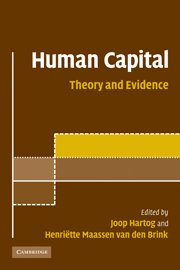Book contents
- Frontmatter
- Contents
- List of figures
- List of tables
- Notes on contributors
- Prologue
- Part I Measuring the benefits from human capital
- Part II Applying and extending the human capital model
- 7 Overeducation in the labour market
- 8 Underinvestment in training?
- 9 Human capital and risk
- Part III Policy interventions
- Epilogue: some reflections on educational policies
- A note on econometrics
- Index
- References
8 - Underinvestment in training?
Published online by Cambridge University Press: 22 September 2009
- Frontmatter
- Contents
- List of figures
- List of tables
- Notes on contributors
- Prologue
- Part I Measuring the benefits from human capital
- Part II Applying and extending the human capital model
- 7 Overeducation in the labour market
- 8 Underinvestment in training?
- 9 Human capital and risk
- Part III Policy interventions
- Epilogue: some reflections on educational policies
- A note on econometrics
- Index
- References
Summary
Introduction
When a newly hired employee enters a firm there are typically many skills he has to acquire before becoming fully productive. A blue-collar worker, for example, needs to get acquainted with the machines and tools with which he is going to work, while white-collar workers usually have to become familiar with, for example, the particular software package in place. Many of these skills are highly firm-specific, i.e. they are of much lower value in other firms. Investing in firm-specific skills is therefore a risky enterprise for the worker. Although the employer may promise to reward the worker for skills acquisition, for instance through a promotion or a wage increase, after the investment has been made she has an incentive to renege on this promise in order to save on labour costs. Reneging is possible for the firm, because the worker cannot collect the return to his newly obtained skills elsewhere (and because the labour contract is incomplete: see below). Of course, workers will anticipate this opportunistic behaviour by the firm and are unlikely to invest in the first place. Likewise, the firm has not much of an incentive to make the investment. Once the worker has obtained the skills, he will bargain for a wage increase or a promotion. The firm is in a weak bargaining position, because the specific skills required ensure that the worker cannot immediately be replaced by another one.
- Type
- Chapter
- Information
- Human CapitalAdvances in Theory and Evidence, pp. 113 - 133Publisher: Cambridge University PressPrint publication year: 2007



